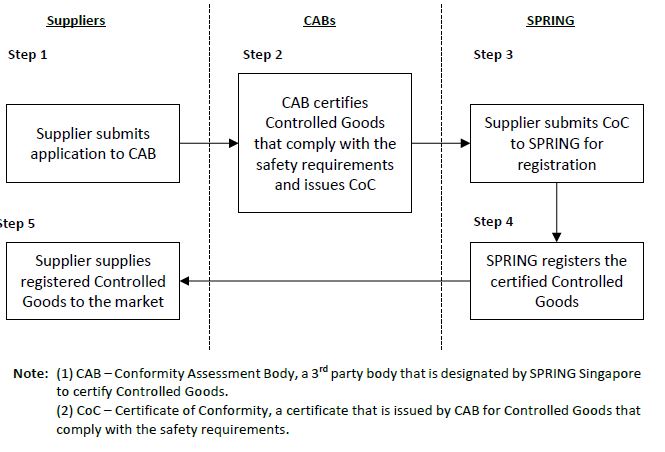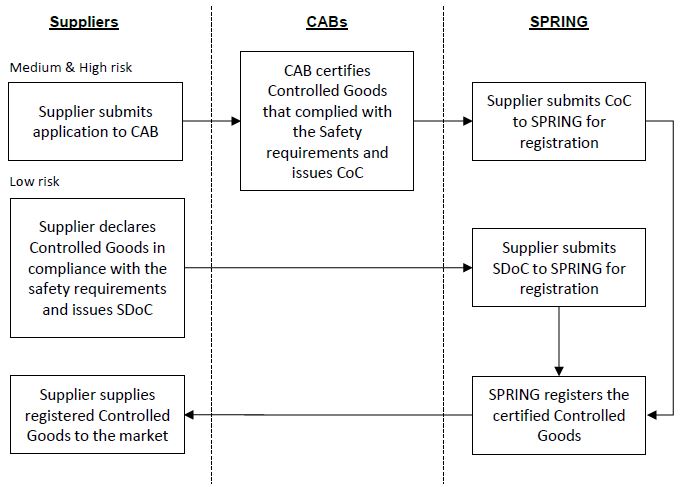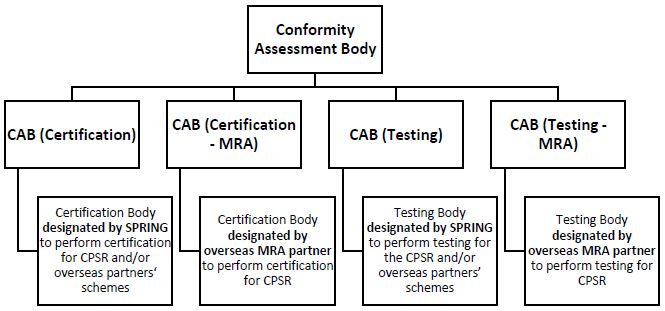
SPRING Singapore
- Consultation Period:
- 14 Aug 2017 - 13 Sep 2017
- Status:
- Closed
Detailed Description
1. Introduction
1.1SPRING Singapore (SPRING) is seeking feedback on the proposed amendments to the Consumer Protection (Safety Requirements) Regulations (“CPSR”) and the Standards, Productivity and Innovation Board (Conformity Assessment) Regulations (“SPIBR”). The public consultation period is from 14 August 2017 to 13 September 2017.
2.Background
2.1 Consumer Protection (Safety Requirements) Regulations
2.1.1SPRING was appointed the Safety Authority in 1991 to administer the CPSR. Under the Regulations, Controlled Goods have to be registered with SPRING and affixed with the SAFETY Mark before they can be supplied or advertised for sale in Singapore. There are currently 45 categories of Controlled Goods (Please refer to Annex A for the full list of Controlled Goods).
2.1.2 SPRING currently applies the same conformity assessment framework for all Controlled Goods. For the registration of all Controlled Goods, a Certificate of Conformity (CoC) has to be issued by one of the designated third-party Conformity Assessment Bodies (CABs). The existing framework for the registration of Controlled Goods is shown below:

Note:
(1) CAB – Conformity Assessment Body, a 3rd party body that is designated by SPRING Singapore to certify Controlled Goods.
(2) CoC – Certificate of Conformity, a certificate that is issued by CAB for Controlled Goods that comply with the safety requirements.
2.2 Standards, Productivity and Innovation Board (Conformity Assessment) Regulations
2.2.1 The regulations empower SPRING as a Designating Authority to designate third-party testing laboratories and certification bodies to perform safety testing and certification of Controlled Goods on behalf of SPRING.
3. Review of Controlled Goods
3.1The European Union-Singapore Free Trade Agreement (EUSFTA) negotiations, which concluded in 2012, called for the following:
a. Elimination of three product categories (immersion water heater, video cassette recorder and mobile split air conditioner) and two subcategories (laser disc & video compact disc players and Cathode ray tube television receiver) from the Controlled Goods product categories.
b. Review of the product categories of Controlled Goods.
c. Recognition of a CoC issued by an EU CAB by the Singapore Regulator.
3.2 SPRING reviewed the product categories of Controlled Goods and adopted a risk-based assessment methodology to determine the risk levels of each of the product categories of Controlled Goods.
3.3 The review resulted in two proposed changes each to the CPSR and the SPIBR.
4. Proposed legislative changes for the Consumer Protection (Safety Requirements) Regulations
4.1 Proposed changes to conformity assessment framework
4.1.1SPRING proposes to categorise products into four risk levels - remote, low, medium or high. Based on the determined risk level of the product category, different conformity assessment approaches are proposed. The table below shows the proposed conformity assessment approaches for each of the four risk levels.

4.1.2 The goods registration process based on the proposed conformity assessment approach is shown below:

4.1.3With this proposed conformity assessment framework, products classified into the ‘remote risk’ category will no longer be in the Controlled Goods list, and will not require any product registration.
4.1.4The product registration for ‘low risk’ products will no longer require third-party certification by a designated conformity assessment body. Instead, a Supplier’s Declaration of Conformity (SDoC) will be accepted. For ‘high risk’ products, there will be increased post market surveillance.
4.1.5The proposed conformity assessment framework will:
a. Ensure higher levels of robustness with increased post market surveillance activities for ‘high risk’ products.
b. Reduce compliance costs for ‘low risk’ or ‘remote risk’ products.
4.2Proposed changes to product categories of Controlled Goods
4.2.1Following the evaluation of the risk-level of each of the product categories, three product categories (immersion water heater, video cassette recorder and mobile split-conditioner) and two subcategories (laser disc & video compact disc players and cathode ray tube television receiver) were determined to be of remote risk and are proposed to be removed from the list of Controlled Goods.
4.2.2The remaining 42 product categories have been reduced and refined to 33 proposed product categories. the proposed redefined product categories are as stated in Annex B.
4.2.3The redefinition of product categories will:
a. Improve clarity and ease of administration for both SPRING and businesses.
b. Broaden existing product categories to accommodate newer products. For example: Renaming product category ‘hair dryer’ to ‘hair care appliances’, to accommodate products such as hair straighteners, stylers, and curlers which were assessed to be of considerable risk.
5. Proposed changes to the Standards, Productivity, and Innovation Board (Conformity Assessment) Regulations
5.1 Proposed changes to designation of Conformity Assessment Body (CAB)
5.1.1 SPRING proposes a First Schedule of prescribed continent/countries to facilitate the inclusion of continent/countries, other than Singapore, for which overseas Conformity Assessment Body (CAB) can be designated to perform certification of Controlled Goods. The EU is currently the only continent listed in the First Schedule. The proposed changes enable SPRING to accept Certificate of Conformity (CoC) issued by a CAB located in the EU.
5.1.2 The proposed changes will facilitate compliance by overseas manufacturers supplying Controlled Goods into Singapore. This will also facilitate the ratification of the EUSFTA.
5.2Redefinition of the terms relating to Conformity Assessment Body (CAB)
5.2.1 The current term for ‘CAB’ can be used interchangeably for either testing laboratory or certification body. The proposed changes aim to provide clarity on the definition of the relevant terms. In this review, CAB is defined as ‘a person that performs conformity assessment or any test relating to conformity assessment. The terms ‘CAB (Local)’, ‘CAB (Local-MRA)’, ‘CAB (Foreign-MRA) and RTL are replaced with ‘CAB (Certification)’, ‘CAB (Certification-MRA)’, ‘CAB (Testing)’ and ‘CAB (Testing-MRA)’. The changes are depicted as follows:

Note: (1) MRA stands for Mutual Recognition Agreement.
(2) Recognised Testing Laboratory (RTL) has been replaced with CAB (Testing).
6. Invitation to provide feedback
6.1SPRING welcomes views and comments on the above proposal. All feedback submissions should be clear and concise, and should provide explanations for suggestions made. Please use the template in Annex C for your submission.
6.2Submissions should reach SPRING no later than 13 September 2017 through email, safety@spring.gov.sg. We regret that we will not be able to address or acknowledge every feedback or comment received. However, all feedback and comments received during the consultation period will be reviewed thoroughly and, if accepted, will be incorporated into the Regulations.
6.3Please note that the draft amendments of the Consumer Protection (Safety Requirements) Regulations and Standards, Productivity and Innovation Board (Conformity Assessment) Regulations are released only for the purpose of consultation and do not represent the final legislation.
Annex A - Current 45 Categories of Controlled Goods
Annex B - Proposed Classification and Description of the Revised 33 Categories of Controlled Goods
Annex C - Template for response to Consultation Paper
Annex D - Draft amendments for Consumer Protection (Safety Requirements) Regulations
Annex F – Frequently Asked Questions on the Proposed Amendments

